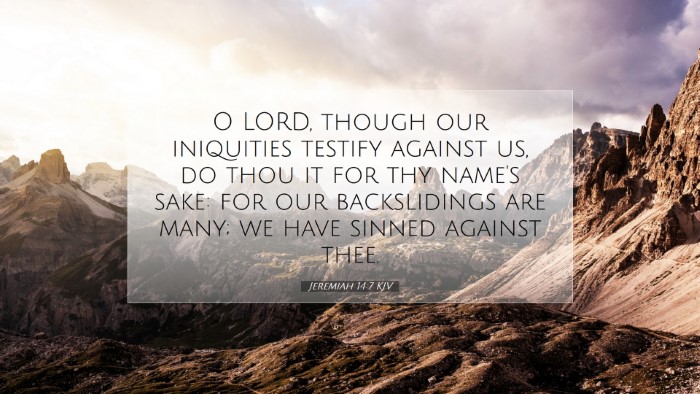Commentary on Jeremiah 14:7
Text of Jeremiah 14:7 (KJV): "O LORD, though our iniquities testify against us, do thou it for thy name's sake: for our backslidings are many; we have sinned against thee."
Introduction
The Book of Jeremiah stands as a profound witness to the struggles, hopes, and the providential grace of God amid the calamities faced by Judah. Chapter 14 presents a poignant moment of intercession where Jeremiah acknowledges the people's sins, underscoring a deep understanding of human frailty alongside God's eternal mercy. This commentary aims to provide insights gathered from notable public domain commentaries, elucidating the richness of God's character as reflected in this verse.
Theological Implications
This verse encapsulates a fundamental truth about sin and redemption. The prophet’s admission of iniquity together with a plea for mercy creates a theological context that scholars and theologians often explore. As Matthew Henry notes, the acknowledgment of sinful nature is crucial for genuine repentance. There is a collective confession which points to a communal understanding of sin—an important aspect in biblical theology as community dynamics are often intertwined with individual transgressions.
Confession of Sin
Jeremiah’s plea begins with a stark confession: "though our iniquities testify against us." This phrase signifies the weight of guilt felt by the people. Albert Barnes expands this idea, suggesting that recognition of sin is the first step towards seeking forgiveness. This view encourages pastors and spiritual leaders to emphasize the importance of confession both corporately and individually as part of spiritual disciplines.
- Corporate Sin: The acknowledgment of backsliding collectively by the people highlights the theological stance that sin is not merely individual but communal. This presents a challenge to contemporary church thought that often emphasizes personal salvation over communal responsibility.
- Nature of Confession: Adam Clarke emphasizes that confession should not merely be an act of acknowledgment but should lead to sincere repentance and a transforming relationship with God, reinforcing the idea that repentance is more than remorse.
The Nature of God's Response
The latter part of Jeremiah 14:7 provides a critical understanding of God's nature: "do thou it for thy name's sake." Here, the appeal to God's character highlights His mercy and faithfulness. Matthew Henry provides a profound insight into the notion that God's actions are motivated by His desire to uphold His name and glory. This aspect should encourage believers to approach God not solely based on their worthiness but on God's unchanging character.
- Divine Mercy: The plea for intervention is rooted in the understanding of God's mercy. It reflects an essential quality of God in His relationship with humanity where grace abounds even amidst transgressions.
- God's Glory: The emphasis on God's name suggests that the outcomes of God's actions are intricately linked to His glory. This reinforces the idea that God's responses are guided by His purpose and glory rather than mere human merit.
Applications for Contemporary Believers
For contemporary believers, Jeremiah 14:7 serves as a foundational scripture for understanding the intersection of sin, repentance, and divine grace. Pastors and theologians may derive several life applications:
- Encouragement in Confession: Encouraging congregations to confess openly can promote a culture of vulnerability and healing within the church body. The admission of faults provides a pathway to restoration.
- Understanding Divine Mercy: Believers should internalize the truth that God's mercy is not contingent upon their performance. This helps in fostering deeper trust in God's character.
- Pursuit of Holiness: A recognition of sin should lead believers to a fervent pursuit of righteousness while understanding that while they are called to holiness, they also must rely on God's grace throughout their journey.
Conclusion
Jeremiah 14:7 serves as a significant reminder of the necessity of humble confession before a merciful God. The combined insights from various commentators highlight key aspects of repentance, divine mercy, and the emphasis on communal sin. For pastors, scholars, and believers, this text offers profound reflections on the nature of sin and the unfathomable grace available through God’s character. It inspires not only an individual response but also a collective journey back towards a relationship with God, firmly grounded in His merciful nature and everlasting truth.


